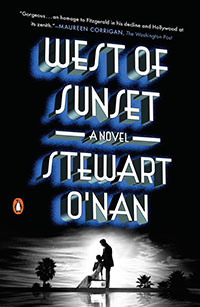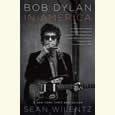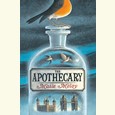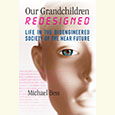Portrait of the Artist as a Screenwriter
Stewart O’Nan’s latest novel captures F. Scott Fitzgerald’s quest for authenticity in Hollywood
Romanticizing the roaring ‘20s is as American as The Great Gatsby, but in his latest novel, Stewart O’Nan imagines the final act in the life of F. Scott Fitzgerald, and it’s far from romantic. West of Sunset is set during Fitzgerald’s years in Hollywood, when he toiled at script-writing and tried to redefine himself and his future. With his wife, Zelda, confined to an asylum and his daughter, Scottie, away at boarding school, O’Nan’s Scott knows that he is still capable of greatness as a writer, but he’s lost faith in himself as a man. When he meets beautiful columnist Sheilah Graham, he falls hard and fast, but their relationship is haunted by Zelda. Scott makes a sincere go at writing scripts, but Hollywood is as fickle with him as anyone, and his health begins to suffer.
 West of Sunset is written in a compelling voice that knows just how much to say. In this hollow and artificial setting, Scott’s circumstances grow bleaker, and O’Nan immerses the reader in the mind of one of our most iconic writers as he cycles through elation, self-loathing, love, and remorse, asking himself how he can remain true to his past as the present crumbles around him. Beset by financial ruin and familial discord, Scott clings to the one thing he has left: his writing.
West of Sunset is written in a compelling voice that knows just how much to say. In this hollow and artificial setting, Scott’s circumstances grow bleaker, and O’Nan immerses the reader in the mind of one of our most iconic writers as he cycles through elation, self-loathing, love, and remorse, asking himself how he can remain true to his past as the present crumbles around him. Beset by financial ruin and familial discord, Scott clings to the one thing he has left: his writing.
Prior to his forthcoming reading in Memphis, O’Nan recently answered questions from Chapter 16 via email:
Chapter 16: In writing this historical novel, how important was it for you to remain true to actual events and people?
Stewart O’Nan: The most important research for me was reading and re-reading all of his and Zelda’s writing, especially their letters to each other. My goal was to use the chronology of Scott’s time in Hollywood as a kind of structure and then look for opportunities to write scenes I felt were missing from the biographies—like the party scenes at the Garden of Allah, or their daytrips away from the asylum, or his conversations with Dorothy Parker or Bogie & Mayo, or being on the lot at MGM.
Chapter 16: F. Scott Fitzgerald’s later years in Hollywood were certainly not the happiest or the most prosperous of his life. In West of Sunset, he’s sympathetic but so self-loathing that it’s difficult to really root for him. Why shatter the image of the suave wild child of the Lost Generation?
O’Nan: He’s been through the worst—he thinks—but he still has a chance to come back, and he’s trying. He’s trying to work and trying to stay sober and trying to pay his bills, and he thinks he might be in love, so he’s got a lot going on, and a lot of pressure on him. Plus, at times, he has the great artist’s ability to see his own situation objectively, with some humor. And what a ripe and glamorous setting to look at what success means. Everyone around him is rich and famous, and here he is, the great writer, pawning his car to make rent.
Chapter 16: You have also written a screenplay based on the life of Edgar Allan Poe. What fascinates you about the lives of artists?
O’Nan: In both cases, I’m drawn to how their romantic views of life collide with their own incredibly difficult lives. The juncture of beauty and squalor, hope and despair, is so pronounced. What do you do after the worst happens? How do you hold on to hope in that situation? How do you keep yourself from coming apart?
Chapter 16: About halfway through West of Sunset, you write, “What was love compared to the ruthless ambition of youth?” This seems a defining thematic statement in the novel, as it encapsulates Scott’s relationships with both Zelda and Sheilah. Can you speak to that at all?
O’Nan: He’s speaking about Sheilah’s ambitions as a journalist. He really admires the go-getter in her, that constant hustle and can-do attitude he sees as quintessentially American, but he knows he’s past that, that he’s no longer young, and what’s truly important is love (what he and Zelda had but lost through carelessness). It’s at the heart of The Last Tycoon, the book he’s just falling into, the lens through which he sees Sheilah and Hollywood and himself.
 Chapter 16: Scott’s mix of emotions regarding Zelda is so complex: responsibility, obligation, resentment, pity, empathy, adoration, shame. When he’s with Zelda I feel that I truly know him, as if he can’t hide any longer. Any truth to that impression?
Chapter 16: Scott’s mix of emotions regarding Zelda is so complex: responsibility, obligation, resentment, pity, empathy, adoration, shame. When he’s with Zelda I feel that I truly know him, as if he can’t hide any longer. Any truth to that impression?
O’Nan: When he’s with Zelda he’s reminded of all he’s squandered and just how damaged she is and his role in that. He can’t forget and can’t pretend he’s happy or will ever be happy again.
Chapter 16: I read that you’re in film negotiations for the novel. This is a wonderful sort of irony because it somewhat places you in Scott’s position. Are you at all nervous about the adaptation?
O’Nan: I’ve been very lucky in that David Gordon Green adapted my first novel, Snow Angels, for the screen. He both wrote and directed it, so it was completely his vision, and it really captured a mood. I’m hoping James Ponsoldt will do the same with West of Sunset.
Chapter 16: Throughout the novel, Scott always seem to have Hemingway on the periphery of his thoughts. He imagines Ernest judging his work, his decisions, his marriage. He waits for letters and cables, calling Hemingway his artistic and political conscience. Do you think that’s true, or was it a manufactured paranoia?
O’Nan: Scott respected Hemingway even when Hemingway was a bad friend to him. Because they shared Max Perkins as an editor and Scott respected Hemingway’s seriousness about his prose, he always measured his success against Hemingway’s. To all three of them, what mattered was the writing. While Scott was insecure because the sales of Tender is the Night were so poor, he also knew he was as good a writer as anyone out there, and I think he believed—correctly—that Hemingway was one of the few people who knew it. The problem was that Hemingway didn’t want any competition, and that included Scott.
Chapter 16: In writing about Fitzgerald, did you learn anything about your own artistic practice, your ambitions, or your past work?
O’Nan: Fitzgerald told his daughter he should have realized after Gatsby that he’d found his line and should have stuck to it, no matter what. Writing about him reminded me of how fortunate I’ve been to do just that—maybe because I came to writing later in life.

Erica Ciccarone is an independent writer living in Nashville. She holds an M.F.A. from the New School and contributes regularly to several arts magazines and to Nashville Public Radio. .





